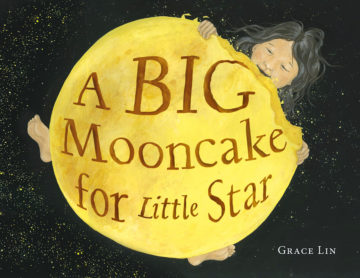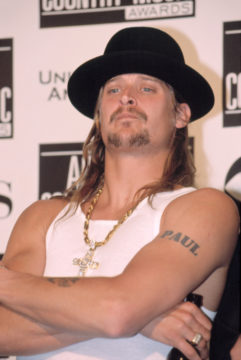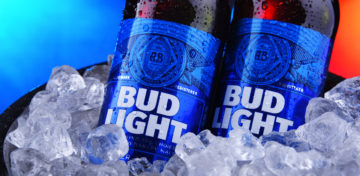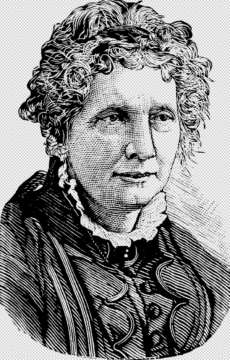by Mark Harvey
Censorship is the strongest drive in human nature; sex is a weak second. –Phil Kerby

Here’s a book that could really harm your child: A Big Mooncake for Little Star. The title itself promises dark political theories of socialism, sexual deviance, and a character-corroding leitmotif. Thank goodness some astute parents saw the danger of the book and got it on a banned-books list.
Here’s the summary of the book’s plot: Little Star, who is a cute little girl, has a mother who likes to bake. She bakes a big moon cake and puts it into the night sky to cool. She asks Little Star not to eat the cake while it cools. The cake looks like the moon and Little Star can’t resist its deliciousness. So night after night, despite her best intentions to leave the cake alone, she tiptoes into the night sky and nibbles away at the cake. The cake shrinks like a waning moon—from full circle to thin crescent–until there are only crumbs left. The mother discovers that her daughter ate the big mooncake and gently admonishes her. Then the two decide to make another cake together.
That’s the entirety of the book. It’s beautifully illustrated and won the Caldecott Medal, one of the most prestigious awards for children’s books. Full disclosure, I had to know what happened to the mooncake and couldn’t put the book down. But it’s definitely something children should not be exposed to. I’m not exactly sure why but if the book was banned, it was banned for a good reason and would surely set children on a dangerous life course. Mooncake is probably shorthand for moonbeam and moonbeam has a vague reference to hippy culture so maybe that’s it. Read the book to your five-year-old and the next thing you know she’s out on the road selling marijuana!
In all seriousness, the book is about as wholesome and innocent a book as there is. But some group of snowflake parents found something that was dangerous and offensive. I have to suspect it was that the author is of Asian heritage and that the mother and daughter who baked the mooncake look Asian.
Book banning is de rigueur these days and on the rise. According to the American Library Association, there were challenges to ban 2,500 books in the United States in 2022, by far the most in the last 20 years. The biggest trigger for the book banners seems to be anything remotely sexual and anything having to do with the LGBTQ community. But there is also quite a bit of banning books that depict historical racism in the US.
Catcher in the Rye and To Kill a Mockingbird are often on the lists of banned books. It’s comical to think that by banning books like Catcher in the Rye or To Kill a Mockingbird, the puritanical set believes it can keep American teenagers pure and chaste for another few years until they’re of marriageable age—or of the age when they can handle Holden Caulfield’s preoccupation with ducks in Central Park.
About 95% of American teenagers have smartphones and according to the Pew Research Center, 97% of teens play video games. When you think of the vast access to porn, violence, conspiracy theories, and truly bad writing that a smartphone gives to youngsters, To Kill a Mockingbird seems like a pretty minor threat. National surveys suggest that about 75% of teenagers have watched porn, most by age 13. Given that it was teenagers surveyed, I’d add another 20 or so percentage points to those numbers.
I’m not a gamer myself but I’ve seen clips from some of the more popular ones like Grand Theft Auto, Mortal Kombat, and Call of Duty. In the span of about 10 minutes, a semi-skilled gamer can kill dozens of digital characters with horrendous weapons and leave a bloody trail of maimed avatars. Again, the thought of banning To Kill a Mocking Bird to protect the delicate sensibilities of some surly gamer who spends several hours per day on their X-Box breaking bones, tearing out organs, launching napalm bombs, and beating up civilians is video-game-level absurd.
If a book like Catcher in the Rye is to be banned, it should be banned because its characters are deeply annoying and the plot is depressing, not because it’s going to corrupt millions of American kids who have basically been marinating in the sex and violence of their smartphones and video games. Can you imagine an acne-ridden 15-year-old kid who has massacred a few thousand people on his Xbox and probably watched a few dozen lurid sex tapes on his smartphone getting triggered by Holden Caulfield’s naughty but somehow astoundingly boring weekend? Parents should pray that their kids have enough literary interest to abandon the digital metaverse for a few hours to make it through Catcher in the Rye.
When I see a feral high-tech American teen ambling down the street with a smartphone, a jaded look, and an attitude, I have to think the best thing that could ever happen to them would be to lock them in a room with all these banned books and only let them out if they could give a decent summary of what happened in three of them. Even if it’s just the plot of A Big Mooncake for Little Star.
This brings us to Bud Light Beer and another set of American snowflakes blowing up cases of the stuff with high-powered assault rifles.

I’ve probably had two Bud Lights in my life, both on occasions when no other beer was available and the days were oppressively hot. Bud Light is the Ken Doll of beers—nondescript, vaguely sexless, and boring. I didn’t know it was the symbol and nectar of American machismo until all the recent videos of wunderkind like Kid Rock stacking up a few cases of the stuff on sawhorses and then blowing the beer cans up with assault rifles. After Kid Rock shoots the beer, he turns to the camera, raises his middle finger and says, “Fuck Bud Light, Fuck Anheuser Busch.” I saw the video before I knew anything about the controversy that caused this man-child’s meltdown, so I naturally pecked “Kid Rock” and “Budweiser” into my search engine.
Turns out the thing that caused Rock to unload all that ammo on beer he had already purchased was a social media post by trans activist and influencer Dylan Mulvaney sponsoring a $15,000 Bud Light Contest. The contest is called #EasyCarry and asks entrants to post photos of themselves carrying three or more Bud Lights or three or more glasses of beer. Anheuser Busch also made a commemorative can of Bud Light with Mulvaney’s face on it, but only for Mulvaney, not for national distribution.
If there’s anything eminently non-threatening on the face of the planet—and even less threatening than Little Star and her mooncake–it’s Dylan Mulvaney. She is a meticulously coiffed trans-gender actress who doesn’t look like she would do well in a bar room brawl against any of the angry Bud LIght crowd shooting up cases of the beer they already paid for. And yet you’d think she was leading the Chinese army on a war campaign against Florida and Texas by the reactions she caused with her ebullient endorsement of Bud Light.
One of the great ironies of all this is that Kid Rock just announced his “No Snowflakes” four-city tour debuting this summer. Rock defines what a snowflake is with his delicate sensibilities and fear that a commemorative can of beer with Mulvaney’s image will bring down the culture buying his albums. The wannabe tough guy simply melted because someone in gender transition was recognized by Anheuser Busch. It’s also ironic that Rock liked Bud Light so much before all this happened. Bud Light seems to have some of Mulvaney’s fluidity in how it identifies as neither beer nor water.
Another rich irony is that one of Rock’s big songs is titled Don’t Tell Me How to Live. The last two lines of the song go,
It ain’t nobody, it ain’t nobody
Ain’t nobody gonna tell me how to live.
I’ll spare you the rest of the song because if anything is a candidate for being censored for sheer mindlessness, it’s the lyrics to that song.
 Rock’s lethal attack on beer cans spawned dozens of other attacks on Bud Light. Some of the attackers seem a little confused as they crush the offending beer, all the while obviously using products that have endorsed the LGBTQ community. For instance, in one video, a very angry snowflake puts a Bud Light under the tire of his monster Chevy truck, hops in the cab and drives over the offending can. He must not know that Chevrolet has a very prominent page on its website endorsing the rights of its LGBTQ customers. The page reads in part, “LGBTQ Nation and Chevy have partnered to create Authentic Voices of Pride, a program that spotlights vital LGBTQ issues through intimate conversations, in-depth editorials and firsthand stories from people within the community.”
Rock’s lethal attack on beer cans spawned dozens of other attacks on Bud Light. Some of the attackers seem a little confused as they crush the offending beer, all the while obviously using products that have endorsed the LGBTQ community. For instance, in one video, a very angry snowflake puts a Bud Light under the tire of his monster Chevy truck, hops in the cab and drives over the offending can. He must not know that Chevrolet has a very prominent page on its website endorsing the rights of its LGBTQ customers. The page reads in part, “LGBTQ Nation and Chevy have partnered to create Authentic Voices of Pride, a program that spotlights vital LGBTQ issues through intimate conversations, in-depth editorials and firsthand stories from people within the community.”
The best answer when the owner finds out about Chevrolet’s blasphemy is to find an LGBTQ-free beer and throw it through the windshield.
As an aside, there is something very comical about driving a 400-horsepower, 6,000-pound vehicle over a 12-ounce beer. I guess it represents just how ANGRY these folks are about Anheuser Busch kind of endorsing Mulvaney. As in a 10,000 to 1 angry ratio.
Taken from a clinical viewpoint, tolerance and support of minorities, be they ethnic, racial, religious, or sexual, is good business. Numerous studies here and abroad have shown that millennials and Gen Zers far prefer to consume products made by companies that profess tolerance rather than from companies of the Kid Rock School of Intolerance. To a Gen Zer who grew up with a smartphone, the full range of the internet, and now easy access to AI, the Kid-Rock set has to look truly cretaceous (with apologies to some of the more forward-looking dinosaurs).
Anheuser-Busch has a marketing budget of roughly $1.5 billion per year in the US alone. One can assume they’ve parsed every demographic in America with a scalpel. Maybe they’re ready to lose some of their intolerant un-American clientele in exchange for gaining some loyalty from the younger generations.

Returning to the intolerant book banners, it’s worth remembering that the first book to face a national ban was Harriet Beecher Stowe’s Uncle Tom’s Cabin. Uncle Tom’s Cabin was the bestselling novel of the 19th century and the second-best-selling book behind—drum roll—the Bible. One can understand why Stowe’s book was so feared: it turned the world of slavery on its head, with heart-wrenching depictions of the immoral slaveholder next to morally admirable slaves. When Lincoln met Stowe in the White House during the Civil War, he is reported to have said, “So this is the little woman who wrote the book that started this great war.”
Easy to forget that books that are now taught in most major universities were once legally banned across the board. Publishers of a magazine called The Little Review were fined for printing a chapter of James Joyce’s Ulysses in the 1920s because it was considered pornographic. The case kept the novel from being printed in the United States for 10 years.
Random House finally forced the issue by very publicly importing copies of Ulysses in 1932. In a case called The United States v. One Book Called Ulysses, held in the Southern District of New York, John Woolsey, the presiding judge, ruled that Ulysses could be printed despite its coarse language and sexual depictions. Woolsey clearly did not like the book or consider its prose to be good enough to cause arousal. But he still recognized that its literary value took it beyond the realm of obscene pornography. He humorously wrote, “Whilst in many places the effect of Ulysses on the reader undoubtedly is somewhat emetic, nowhere does it tend to be an aphrodisiac.” I haven’t read Ulysses and I had to look up emetic. It means of a substance causing vomiting.
Even if Woolsey didn’t like Ulysses, he probably would have agreed with Mark Twain when he said, “Censorship is telling a man he can’t have a steak just because a baby can’t chew it.”
The older I get the more I suspect and distrust the big moralizers. So often we find that the ones preaching a high morality are the ones violating children or carrying on affairs that they disdain on the dais. The most powerful moralizers on the face of the planet are the long line of popes who constantly turn a blind eye to the pedophiles that run thick through their parishes. Those same moralizers fret over fairly harmless books while their official charges commit the truly pornographic.

There’s nothing pornographic or objectionable to Little Star and her mooncake. The prurience in Catcher in The Rye is weak tea next to what’s out there on the radio, television or the Internet. Kid Rock, who drapes himself in the American Flag, is decidedly un-American with his bigotry and intolerance. The librarians and teachers across the country fighting against the wave of book censorship and for the freedom of ideas are far more American in the best sense of the word than he is. Let Rock and his snowflake friends drown their sorrows in flat beer that accommodates their delicate sensibilities.
